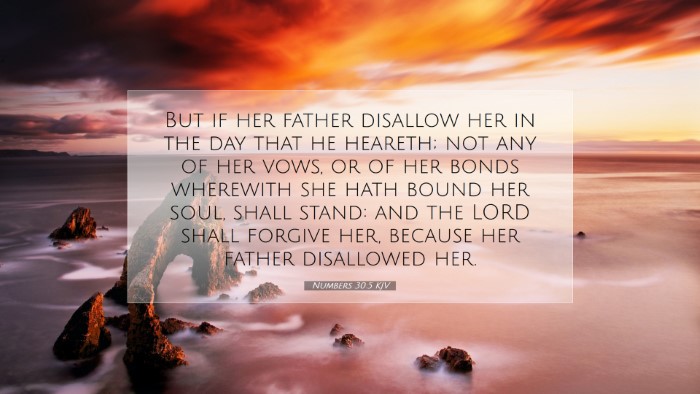Commentary on Numbers 30:5
Numbers 30:5 states, "But if her father disallows her in the day that he hears; not any of her vows, or of her bonds wherewith she hath bound her soul, shall stand: and the LORD shall forgive her, because her father disallowed her." This verse addresses the significant issue of vows made by daughters, emphasizing the authority of the father in these matters. The following commentary aims to provide a comprehensive understanding through insights from Matthew Henry, Albert Barnes, and Adam Clarke.
Contextual Analysis
This passage is situated within a discourse regarding vows and their binding nature. It reflects the culture and societal structure of ancient Israel, where familial relationships and authority dynamics played a crucial role. Understanding this context is essential to interpreting the verse correctly.
Insights from Matthew Henry
Matthew Henry emphasizes the father's authority over his daughter's vows as a protective measure. He notes that this provision reflects God's design for family order and the importance of safeguarding women within the community. Henry articulates that when a daughter makes a vow, the father's permission or disallowance is crucial, as it signifies his role in guiding her spiritual and moral decisions:
- Parental Authority: Henry stresses that a father's disallowance of vows demonstrates the weight of parental authority in the spiritual life of their children.
- Guidance and Forgiveness: The provision for forgiveness in cases where the father does not permit the vow indicates God's understanding of familial dynamics and His mercy toward the individual’s intentions.
- Reflection of God's Order: The structure presented shows a divinely instituted order and should promote stability within households.
Insights from Albert Barnes
Albert Barnes provides a practical evaluation of the ramifications of this verse. He details how vows can have profound implications on a person's life and emphasizes the importance of invoking parental counsel in such significant matters:
- Obligation of Vows: Barnes notes that vows should not be taken lightly. When someone makes a vow, they are entering into a serious commitment that calls for careful reflection and often the counsel of authority figures.
- Importance of Communication: The necessity for a father to hear his daughter’s vow underlines the importance of family communication regarding spiritual commitments.
- Cultural Implications: This dynamic illustrates the cultural setting of ancient Israel, where individuals were often part of larger familial units, and decisions were made collectively rather than in isolation.
Insights from Adam Clarke
Adam Clarke approaches Numbers 30:5 with a focus on the theological implications of the text. He expands on the notion of God’s grace and forgiveness as it pertains to familial authority:
- The Nature of Vows: Clarke emphasizes that vows are a serious matter and should not be taken hastily, as they bind the individual spiritually and morally.
- Role of Fathers: The father’s ability to disallow the vow speaks to the God-ordained structure within the family. Clarke further elaborates on how this promotes accountability and responsibility.
- God's Mercy: Importantly, Clarke points out the forgiveness bestowed by God when a vow is not upheld due to paternal disapproval, showcasing God's merciful nature in the lives of His people.
Theological Reflections
Throughout these commentaries, several theological reflections arise from Numbers 30:5:
- The Authority of God: The text ultimately reflects the sovereignty of God, implying that whatever decisions made in families should align with His directives and purposes.
- Human Relationships: The verse underscores the intricate balance of personal convictions and familial responsibilities, providing a framework for understanding how individual desires fit within God's established order.
- Forgiveness: The provision for forgiveness indicates that God knows human limitations and the complexities of interpersonal relationships, extending grace to those who may err through lack of counsel.
Practical Applications
As pastors and theologians reflect on this text, several practical applications can be drawn:
- Teaching on Vows: Pastors can emphasize the significance of adhering to vows and the necessity of seeking counsel before making binding commitments.
- Promoting Family Discussions: Encourage families to discuss spiritual matters openly, ensuring that all members, especially young daughters, feel supported in their spiritual journeys.
- Encouraging Forgiveness: The message of forgiveness should be highlighted in community teachings, reminding individuals of God’s grace in the face of missteps.
Conclusion
Numbers 30:5 provides a profound glimpse into the intricacies of familial authority, the seriousness of vows, and the nature of divine grace. Through insights from Matthew Henry, Albert Barnes, and Adam Clarke, we come to appreciate the complexity of spiritual commitments within a familial context and the overarching mercy of God that guides His people. As we engage with this text, let us be reminded of our responsibilities both to uphold our own commitments and to nurture a culture of accountability and open communication within our families and communities.


